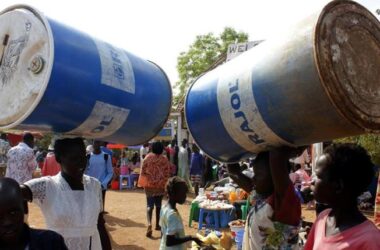By Firas Raad, World Bank Country Manager for South Sudan
South Sudan must leverage its water endowment and move towards a long-term development approach to address water insecurity
South Sudan faces a vicious cycle of water insecurity and fragility. Decades of conflict and social instability have undermined the ability of people and institutions to respond to water-related threats, so that once floods or droughts strike, the ensuing damage is even greater. In turn, failure to respond to these threats further exacerbates the drivers of conflict, pushing vulnerable communities to the brink. Climate change brings about more frequent and extreme floods and droughts, leading to greater water-related impacts and thus fueling the vicious cycle.
While current humanitarian modalities of water management have provided much needed relief and saved human lives, they are a blunt instrument for helping South Sudan break this cycle. Humanitarian and emergency responses, such as temporary embankment rehabilitation and provision of rural water points, are crucial to respond to urgent challenges and meet immediate needs. However, they are not well suited to provide long-term and cost-effective solutions to persistent water challenges. If water is to become an engine for recovery and development as opposed to a threat multiplier, South Sudan must embark on a gradual transition from humanitarian modalities of water management towards a long-term, government-led development approach.
Where does such a transition begin? Given the complexity of South Sudan’s water sector challenges, South Sudan urgently needs to start developing a holistic strategy for water management that would help guide this transition and include a wide range of stakeholders. The elaboration of this strategy is necessarily a political task and, as such, should follow an inclusive and iterative process that considers the perspective of a wide range of stakeholders, from state and county governments to community-level institutions. The Ministry of Water Resources and Irrigation is well placed to lead these efforts.
The importance of a government-led, strategic approach to water management is one of the key findings of the World Bank’s new report Rising from the Depths. The report provides the first comprehensive and independent water security assessment for the country since independence and identifies four action areas to be pursued moving forward.
Access to drinking water supply and sanitation is a key starting point. With 60% of the population (or about 6.6 million people) lacking access to basic drinking water supply and three out of four people practicing open defecation, foundational investments are needed to accelerate human capital attainment. This can be achieved by strengthening service delivery models for rural households, sustainable use and management of groundwater resources, and promotion of climate resilient solutions. Continued collaboration with international partners will be essential to deliver much needed water services.
Management of water-related ecosystems is also vital. The country’s wetlands and floodplains provide a range of ecosystem services, supporting livelihoods, regulating water flows, and providing habitats for biodiversity. There is a need to protect these assets, whose value is estimated to be at least $ 3.2 billion, and to further leverage water’s productive potential for livelihoods and irrigation. South Sudan’s solar irrigation adoption potential is among the highest in Sub-Saharan Africa but unfortunately remains untapped.
A third priority is disaster risk management. This requires building water infrastructure, including water storage. However, responding to floods and droughts is not just a matter of building infrastructure, but also of preventing populations from moving into harm’s way and of devising information systems and institutional arrangements to increase preparedness and early warning systems. In the short-term, the expansion of hydrometeorological services, early warning systems and delineation of flood and drought prone areas are urgently needed to reduce losses from floods and droughts.
None of this can be achieved in the absence of effective policy and institutional frameworks. This requires empowering and building the capacity of the sector’s human resources, updating, and achieving the ratification of the 2013 Water Bill, and developing a water resources master plan to guide investment prioritization over the next decade.
Large-scale river engineering is a risky endeavor in the absence of a broadly endorsed sector strategy, comprehensive environmental and social impact assessments, and strong capacity for strategic planning and infrastructure management. In the near-term, policymakers should prioritize community-level water storage and flood control alternatives that can be built over shorter time horizons, while mitigating harmful environmental and social externalities.
The stakes are high. South Sudan needs to ramp up its efforts to manage its water-related challenges in this era of accelerating climate change. The World Bank stands ready to work in partnership with the government, civil society, the private sector, as well as regional and international agencies to enhance the country’s water security.



